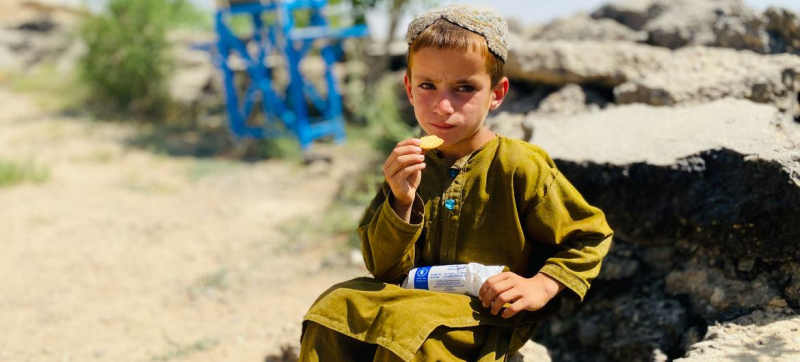- Iran vows to hit all ME economic hubs if US-Israeli attacks persist |
- Sammilito Islami Bank merger to continue: Governor |
- Biman Suspends Flights to Six Middle East Cities Over Tensions |
- Govt Announces 25pc Rail Fare Discount |
- Middle East War Puts Bangladesh Jobs at Risk |
Funding cuts push millions toward hunger: WFP

A primary school student in Zabul Province, Afghanistan, eats fortified biscuits provided by WFP (file)
Nearly 14 million people could face severe hunger by the end of this year, the World Food Programme (WFP) warned on Wednesday, as deep cuts in humanitarian funding threaten six of its most critical operations.
Programmes in Afghanistan, the Democratic Republic of the Congo (DRC), Haiti, Somalia, South Sudan and Sudan are already facing major disruptions — and the situation is expected to worsen further.
“Every ration cut means a child goes to bed hungry, a mother skips a meal, or a family loses the support they need to survive,” said WFP Executive Director Cindy McCain.
Record hunger, reduced budget
The crisis comes as global hunger reaches record levels, with 319 million people facing acute food insecurity, including 44 million at emergency levels. Famine has already taken hold in Sudan and the Gaza Strip.
WFP expects to receive 40 per cent less funding this year, resulting in a projected budget of $6.4 billion, down from $10 billion in 2024.
“We are at risk of losing decades of progress in the fight against hunger,” Ms McCain warned.
“Even hard-won gains in the Sahel region — where 500,000 people have been lifted out of aid dependence through integrated food assistance and resilience programmes — could soon be wiped out without continued support.”
Critical operations at risk
The funding cuts could push 13.7 million people who currently receive WFP food assistance from crisis to emergency levels of hunger — a one-third increase, the agency said in a new report.
In Afghanistan, “dramatic reductions” mean that food assistance is now reaching less than 10 per cent of those in need, despite soaring malnutrition rates.
The DRC is facing record levels of hunger, with roughly a quarter of the population — 28 million people — food insecure.
WFP had planned to feed 2.3 million people there this month, but that number has been slashed to 600,000, and “a complete pipeline break” could occur by February.
“In Haiti, hot meal programmes have already stopped, and families are receiving only half of WFP’s standard monthly rations,” the agency said, adding that “support in Somalia has been downsized repeatedly” — from 2.2 million people last year to just 350,000 in November.
All WFP food recipients in South Sudan now receive reduced rations, which will be missing some food items from October as in-country stocks run out.
Meanwhile, WFP currently supports four million people each month in war-torn Sudan, where 25 million people — half the population — are facing acute food insecurity.
Commitment to deliver
WFP said that its preparedness efforts have also suffered. For the first time in nearly a decade, there are no contingency food stocks for the hurricane season in Haiti, and no pre-positioning of supplies in Afghanistan as winter approaches.
Although the cuts have varied impacts across different operations, the agency remains committed to delivering food assistance in the world’s hungriest places.
“The devastating harm inflicted by cuts to food assistance not only threatens lives but also risks undermining stability, fuelling displacement, and stoking broader social and economic upheaval,” Ms McCain said.
“Swift and effective food assistance is a vital bulwark against chaos in nations already struggling to cope.”

